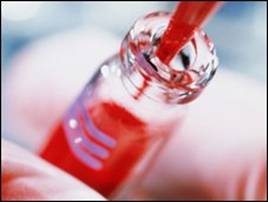|
Hope for Test to Measure Ageing
News.bbc.co.uk
June 16, 2009
World

A simple blood test may reveal the speed of ageing
Scientists are developing a simple blood test to measure how fast the body's tissues are ageing at a molecular
level.
They have found that as tissue ages, concentrations of a protein called p16INK4a dramatically increases.
Measuring levels of the protein could potentially provide a way to assess how healthy the tissues are, and how they will respond to surgery or drugs.
The University of North Carolina study appears in the journal Aging Cell.
Scientists are already interested in p16INK4a because it is known to play a role in suppressing the development of cancer.
The protein is present in the T-cells of the immune system, which play a key role in fighting disease, and repairing tissue damage.
Physical inactivity link
Not only did the North Carolina team show that levels were closely related to cellular ageing, they also found a strong link with certain behaviours, such as tobacco use and physical inactivity, which are known to accelerate the ageing process.
They say they have overcome technical hurdles to begin perfecting a simple blood test to detect levels of the protein.
To test its accuracy, they analysed blood samples from 170 people, who also filled out a questionnaire about their health and lifestyle.
Researcher Dr Norman Sharpless said: "This is a major step toward a practical tool to clinically determine a person's actual molecular, as opposed to just their chronological age.
"Although we don't know whether this test is a good reflection of cellular age in all types of human tissues, we believe it is a first step toward a better understanding of issues like the suitability of organs for transplantation, how well patients are likely to recover after surgery or the future toxicity of chemotherapy for cancer patients."
The researchers were surprised to find that levels of the protein were not linked to obesity, even though research has suggested that limiting calorie intake may help to slow down the ageing process.
Dr Sharpless said this raised the possibility that a lack of exercise may have a more profound impact on molecular ageing than being overweight or obese.
Professor Tim Spector, of Kings College London, has carried out much research into how ageing is related to the length of strands of DNA called telomeres which protect our chromosomes from damage.
He said: "p16INK4a clearly has potential for use as a novel marker of biological aging.
"However, much more work in larger numbers needs to be done to see if it is better than the other existing marker - telomere length - or indeed if it is good enough to be useful at an individual level in predicting rates of ageing."
More
Information on World Health Issues
Copyright © Global Action on Aging
Terms of Use |
Privacy Policy | Contact
Us
|



